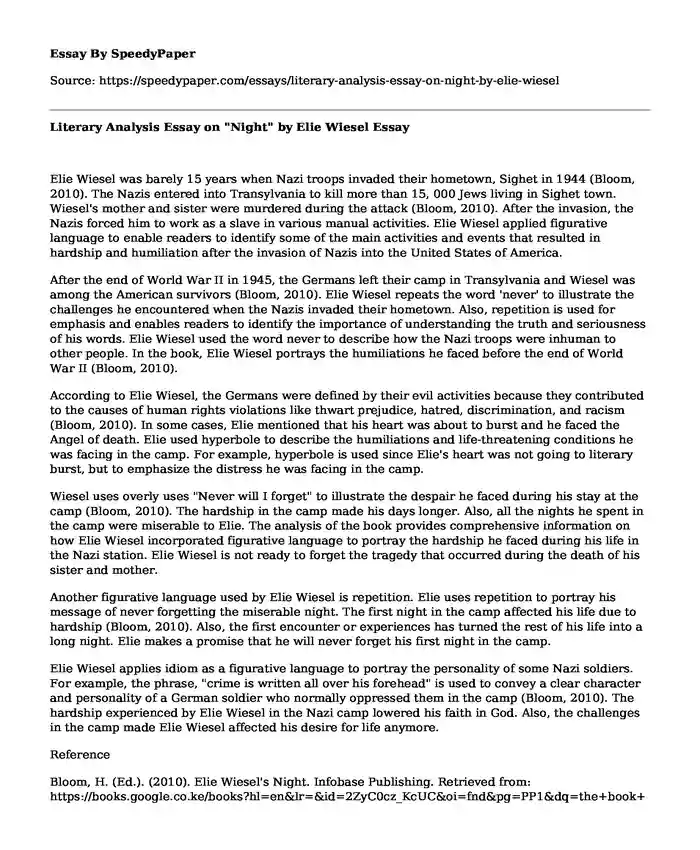
| Type of paper: | Essay |
| Categories: | World literature Historical literature |
| Pages: | 3 |
| Wordcount: | 577 words |
Elie Wiesel was barely 15 years when Nazi troops invaded their hometown, Sighet in 1944 (Bloom, 2010). The Nazis entered into Transylvania to kill more than 15, 000 Jews living in Sighet town. Wiesel's mother and sister were murdered during the attack (Bloom, 2010). After the invasion, the Nazis forced him to work as a slave in various manual activities. Elie Wiesel applied figurative language to enable readers to identify some of the main activities and events that resulted in hardship and humiliation after the invasion of Nazis into the United States of America.
After the end of World War II in 1945, the Germans left their camp in Transylvania and Wiesel was among the American survivors (Bloom, 2010). Elie Wiesel repeats the word 'never' to illustrate the challenges he encountered when the Nazis invaded their hometown. Also, repetition is used for emphasis and enables readers to identify the importance of understanding the truth and seriousness of his words. Elie Wiesel used the word never to describe how the Nazi troops were inhuman to other people. In the book, Elie Wiesel portrays the humiliations he faced before the end of World War II (Bloom, 2010).
According to Elie Wiesel, the Germans were defined by their evil activities because they contributed to the causes of human rights violations like thwart prejudice, hatred, discrimination, and racism (Bloom, 2010). In some cases, Elie mentioned that his heart was about to burst and he faced the Angel of death. Elie used hyperbole to describe the humiliations and life-threatening conditions he was facing in the camp. For example, hyperbole is used since Elie's heart was not going to literary burst, but to emphasize the distress he was facing in the camp.
Wiesel uses overly uses "Never will I forget" to illustrate the despair he faced during his stay at the camp (Bloom, 2010). The hardship in the camp made his days longer. Also, all the nights he spent in the camp were miserable to Elie. The analysis of the book provides comprehensive information on how Elie Wiesel incorporated figurative language to portray the hardship he faced during his life in the Nazi station. Elie Wiesel is not ready to forget the tragedy that occurred during the death of his sister and mother.
Another figurative language used by Elie Wiesel is repetition. Elie uses repetition to portray his message of never forgetting the miserable night. The first night in the camp affected his life due to hardship (Bloom, 2010). Also, the first encounter or experiences has turned the rest of his life into a long night. Elie makes a promise that he will never forget his first night in the camp.
Elie Wiesel applies idiom as a figurative language to portray the personality of some Nazi soldiers. For example, the phrase, "crime is written all over his forehead" is used to convey a clear character and personality of a German soldier who normally oppressed them in the camp (Bloom, 2010). The hardship experienced by Elie Wiesel in the Nazi camp lowered his faith in God. Also, the challenges in the camp made Elie Wiesel affected his desire for life anymore.
Reference
Bloom, H. (Ed.). (2010). Elie Wiesel's Night. Infobase Publishing. Retrieved from: https://books.google.co.ke/books?hl=en&lr=&id=2ZyC0cz_KcUC&oi=fnd&pg=PP1&dq=the+book+%22Night%22+by+Elie+Wiesel&ots=r-mrOGMDzS&sig=tUXAqKPUE0QdpSZwNhx7I5CxFoM&redir_esc=y#v=onepage&q=the%20book%20%22Night%22%20by%20Elie%20Wiesel&f=false
Cite this page
Literary Analysis Essay on "Night" by Elie Wiesel. (2023, Apr 01). Retrieved from https://speedypaper.net/essays/literary-analysis-essay-on-night-by-elie-wiesel
Request Removal
If you are the original author of this essay and no longer wish to have it published on the SpeedyPaper website, please click below to request its removal:
- Reflective Essay Sample: Team Management
- Understanding of the Definition of an Emergency - Essay Sample
- Free Essay about Philosopher: Jean Jacque Rousseau
- Free HRM Essay: The Logic for Organization to Be Concerned About Sleepiness of Their Employees
- Children as Enemies - Book Review Essay Example
- Essay Sample: The Idea of Ideology and Race
- Free Essay: Training Leaders to Have Effective Leadership
Popular categories




